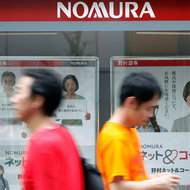 Kiyoshi Ota/Bloomberg NewsA branch of Nomura Securities in Tokyo.
Kiyoshi Ota/Bloomberg NewsA branch of Nomura Securities in Tokyo.
With Nomura announcing $1 billion in cost cuts on Friday, the Japanese firm formally and concretely revealed a retreat from the role it once sought at a global financial player.
Much of the shrinking will take place in Nomura’s wholesale operations, a spokesman told Bloomberg News. That’s precisely the area where the firm’s former chief executive, Kenichi Watanabe, had hoped to grow one of Japan’s most prominent securities firms.
Much like another international bank, Barclays of Britain, Nomura had hoped to use the remains of Lehman Brothers as the underpinning for a transformation from regional player to worldwide heavyweight. The Japanese firm, already a big player in its home market, bought Lehman’s international businesses and its 8,000 staff members after the American brokerage firm filed for bankruptcy in September 2008.
Nomura turned to Jasjit Bhattal, a former Lehman executive known as Jesse, to essentially take charge of the wholesale division. And a longtime colleague, Glenn Schiffman, was appointed as the firm’s head of investment banking for the Americas.
Other Lehman holdovers were also given top positions in the newly prominent division.
The transformation wasn’t necessarily easy, as hard-charging Lehman veterans ran into the more traditionally conservative ways of Nomura. The wholesale operations quickly started to fray. Christian Meissner, a high-ranking Lehman executive who helped broker the takeover of the bankrupt firm’s international division, decamped in 2010 to Bank of America Merrill Lynch.
Unlike Barclays, the Japanese firm found international growth a difficult task. Despite the addition of a well-established international banking operation, Nomura stayed mostly flat in various investment banking league tables.
It hasn’t risen higher than 10th in Thomson Reuters‘ ranking of deal advisers since 2002 or ninth in global equity capital markets issues. For global debt offerings, the firm rose no higher than 14th since the Lehman deal, after having once reached 13th, in 2002.
Mr. Bhattal retired from Nomura in January after less than a year in the position. By that point, the firm had already reported a $591 million loss for the three months that ended Sept. 30, its first quarterly loss in more than two years.
Soon afterward, Mr. Schiffman departed, resurfacing at the Raine Group, a boutique investment bank.
The final blow for Nomura’s dreams of global expansion may well have been the resignation of Mr. Watanabe last month, after having been engulfed by an insider trading scandal. Some critics laid the blame for the mess — in which employees tipped off favored clients ahead of securities offerings — on the Lehman transaction, though the firm had been embroiled by criminal acts in the 1990s.
Mr. Watanabe’s successor, Koji Nagai, has spent most of his career focused on Nomura’s domestic operations. While Mr. Nagai plans to continue building some international businesses like mergers advisory, according to Bloomberg, he has made clear what his strategy is.
“I want to make a new business strategy from the past,” he said at a news conference last month, adding that he wants to bring Nomura’s footprint “to an appropriate size.”
Nomura’s global mergers advisory rankings
Nomura’s global equity capital rankings
Nomura’s global debt capital rankings
Article source: http://dealbook.nytimes.com/2012/08/31/nomuras-failed-global-ambitions/?partner=rss&emc=rss